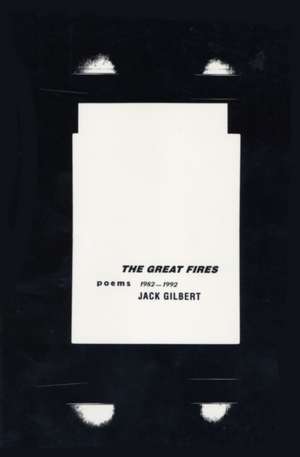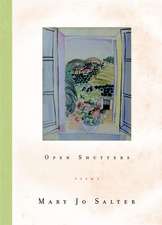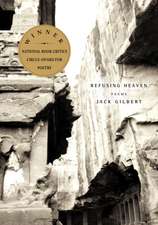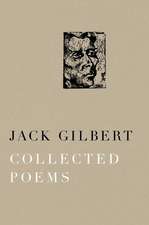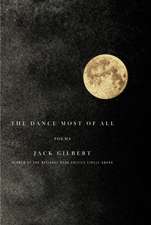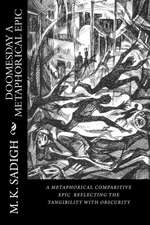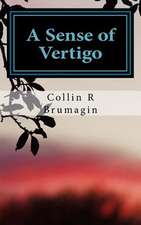The Great Fires: Poems, 1982-1992
Autor Jack Gilberten Limba Engleză Paperback – 31 ian 1996
The "far, stubborn, disastrous" course of Jack Gilbert's resolute journey--not one that would promise in time to bring him home to the consolations of Penelope and the comforts of Ithaca but one that would instead take him ever outward to the impossible blankness of the desert--could never have been achieved in the society of others. What has kept this great poet brave has been the difficult company of his poems--and now we have, in Gilbert's third and most silent book, what may be, what must be, the bravest of these imperial accomplishments.
Preț: 102.32 lei
Nou
Puncte Express: 153
Preț estimativ în valută:
19.58€ • 21.26$ • 16.45£
19.58€ • 21.26$ • 16.45£
Carte disponibilă
Livrare economică 02-16 aprilie
Preluare comenzi: 021 569.72.76
Specificații
ISBN-13: 9780679747673
ISBN-10: 0679747672
Pagini: 112
Dimensiuni: 139 x 215 x 11 mm
Greutate: 0.14 kg
Ediția:New.
Editura: Knopf Publishing Group
ISBN-10: 0679747672
Pagini: 112
Dimensiuni: 139 x 215 x 11 mm
Greutate: 0.14 kg
Ediția:New.
Editura: Knopf Publishing Group
Notă biografică
Jack Gilbert was born in Pittsburgh. He has published Views of Jeopardy, the 1962 winner of the Yale Younger Poets Series, and Monolithos. Both books were nominated for the Pulitzer Prize. A third volume, elegiac poems, was bought out, in a limited edition, under the title Kochan. Mr. Gilbert has been awarded a Guggenheim Fellowship and a grant from the National Endowment for the Arts.
Extras
Measuring the Tyger
Barrels of chains. Sides of beef stacked in vans.
Water buffalo dragging logs of teak in the river mud
outside Mandalay. Pantocrater in the Byzantium dome.
The mammoth overhead crane bringing slabs of steel
through the dingy light and roar to the giant shear
that cuts the adamantine three-quarter-inch plates
and they flop down. The weight of the mind fractures
the girders and piers of the spirit, spilling out
the heart's melt. Incandescent ingots big as cars
trundling out of titanic mills, red slag scaling off
the brighter metal in the dark. The Monongahela River
below, night's sheen its belly. Silence except
for the machinery clanging deeper in us. You will
love again, people say. Give it time. Me with time
running out. Day after day of the everyday.
What they call real life, made of eighth-inch gauge.
Newness strutting around as if it were significant.
Irony, neatness and rhyme pretending to be poetry.
I want to go back to that time after Michiko's death
when I cried every day among the trees. To the real.
To the magnitude of pain, of being that much alive.
To See If Something Comes Next
There is nothing here at the top of the valley.
Sky and morning, silence and the dry smell
of heavy sunlight on the stone everywhere.
Goats occasionally, and the sound of roosters
in the bright heat where he lives with the dead
woman and purity. Trying to see if something
comes next. Wondering whether he has stalled.
Maybe, he thinks, it is like the Noh: whenever
the script says dances, whatever the actor does next
is a dance. If he stands still, he is dancing.
Scheming in the Snow
There is a time after what comes after
being young, and a time after that, he thinks
happily as he walks through the winter woods,
hearing in silence a woodpecker far off.
Remembering his Chinese friend
whose brother gave her a jade ring from
the Han Dynasty when she turned eighteen.
Two weeks later, when she was hurrying up
the steps of a Hong Kong bridge, she fell,
and the thousand-year-old ring shattered
on the concrete. When she told him, stunned
and tears running down her face, he said,
"Don't cry. I'll get you something better."
Barrels of chains. Sides of beef stacked in vans.
Water buffalo dragging logs of teak in the river mud
outside Mandalay. Pantocrater in the Byzantium dome.
The mammoth overhead crane bringing slabs of steel
through the dingy light and roar to the giant shear
that cuts the adamantine three-quarter-inch plates
and they flop down. The weight of the mind fractures
the girders and piers of the spirit, spilling out
the heart's melt. Incandescent ingots big as cars
trundling out of titanic mills, red slag scaling off
the brighter metal in the dark. The Monongahela River
below, night's sheen its belly. Silence except
for the machinery clanging deeper in us. You will
love again, people say. Give it time. Me with time
running out. Day after day of the everyday.
What they call real life, made of eighth-inch gauge.
Newness strutting around as if it were significant.
Irony, neatness and rhyme pretending to be poetry.
I want to go back to that time after Michiko's death
when I cried every day among the trees. To the real.
To the magnitude of pain, of being that much alive.
To See If Something Comes Next
There is nothing here at the top of the valley.
Sky and morning, silence and the dry smell
of heavy sunlight on the stone everywhere.
Goats occasionally, and the sound of roosters
in the bright heat where he lives with the dead
woman and purity. Trying to see if something
comes next. Wondering whether he has stalled.
Maybe, he thinks, it is like the Noh: whenever
the script says dances, whatever the actor does next
is a dance. If he stands still, he is dancing.
Scheming in the Snow
There is a time after what comes after
being young, and a time after that, he thinks
happily as he walks through the winter woods,
hearing in silence a woodpecker far off.
Remembering his Chinese friend
whose brother gave her a jade ring from
the Han Dynasty when she turned eighteen.
Two weeks later, when she was hurrying up
the steps of a Hong Kong bridge, she fell,
and the thousand-year-old ring shattered
on the concrete. When she told him, stunned
and tears running down her face, he said,
"Don't cry. I'll get you something better."
Textul de pe ultima copertă
Joyce's Motto has had much fame but few apostles. Among them, there has been Jack Gilbert and his orthodoxy, a strictness that has required of this poet, now in the seventh decade of his severe life, the penalty of his having had almost no fame at all. In an era that puts before the artist so many sleek and official temptations, keeping unflinchingly to a code of "silence, exile, and cunning" could not have been managed without a show of strictness well beyond the reach of the theater of the coy. The "far, stubborn, disastrous" course of Jack Gilbert's resolute journey - not one that would promise in time to bring him home to the consolations of Penelope and the comforts of Ithaca but one that would instead take him ever outward to the impossible blankness of the desert - could never have been achieved in the society of others. What has kept this great poet brave has been the difficult company of his poems - and now we have, in Gilbert's third and most silent book, what may be, what must be, the bravest of these imperial accomplishments.
